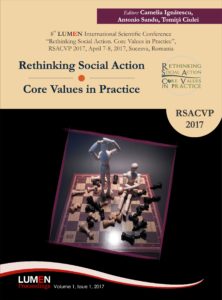The Early Maladaptive Cognitive Schemas and Personality Traits in Emerging Adulthood
The Early Maladaptive Cognitive Schemas and Personality Traits in Emerging Adulthood
Author(s): Violeta Lungu, Mihaela Stomff
Subject(s): Essay|Book Review |Scientific Life
Published by: Editura Lumen, Asociatia Lumen
Keywords: arly Maladaptive Schemas; Five-Factor Personality Traits; Personality Development.
Summary/Abstract: The purpose of this research is to identify the relationship between early maladaptive cognitive schemas and the actual tendencies to prolong of teen ageing in contemporary society. There is a psychological research proving the existence of a new developmental stage, the so-called „Millennial Generation – Young Adults Living in Their Parents’ Home”. They are delaying the launching process toward an autonomous adult life, with the traditional developmental tasks, such as finding a stable job, starting a family and having children. According to these studies, some of the possible causes are the reduced social pressure and the possibility to prolong the student-being state for an indefinite period. The present study has also investigated the relationship between early maladaptive cognitive schemas and personality traits (The Big Five model), describing the path through the emerging adulthood. The research was conducted on a group of 212 emerging adults, aged 22-30, highlighting meaningful relationships among personality traits and early maladaptive cognitive schemas. The study also found that these variables are predictors for an autonomous life path versus a prolonged youth.
Book: Rethinking Social Action. Core Values in Practice
- Page Range: 424-437
- Page Count: 15
- Publication Year: 2017
- Language: English
- Content File-PDF

